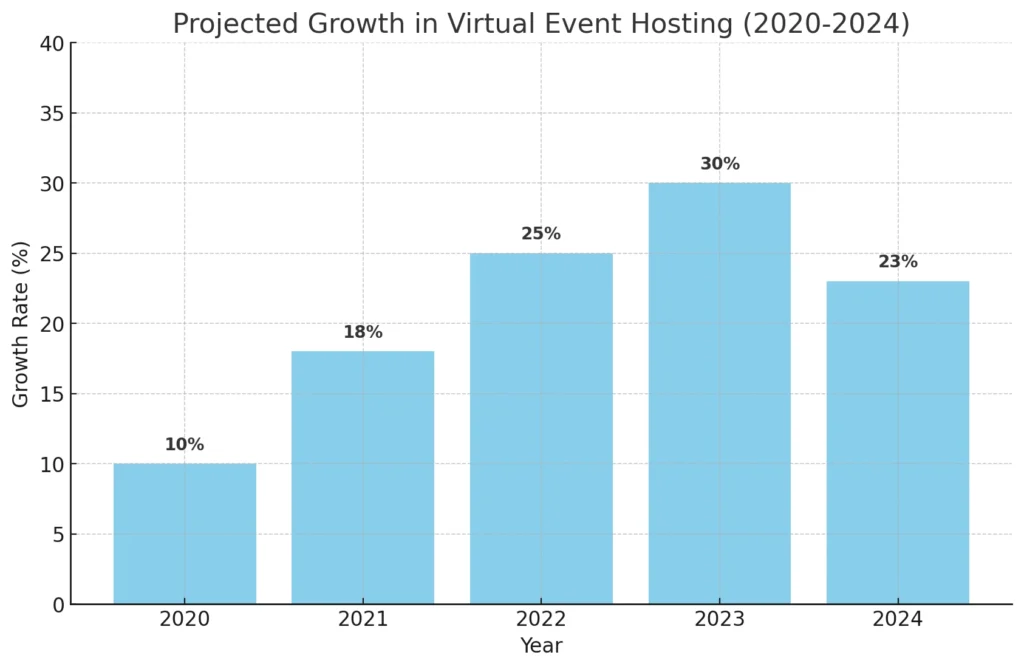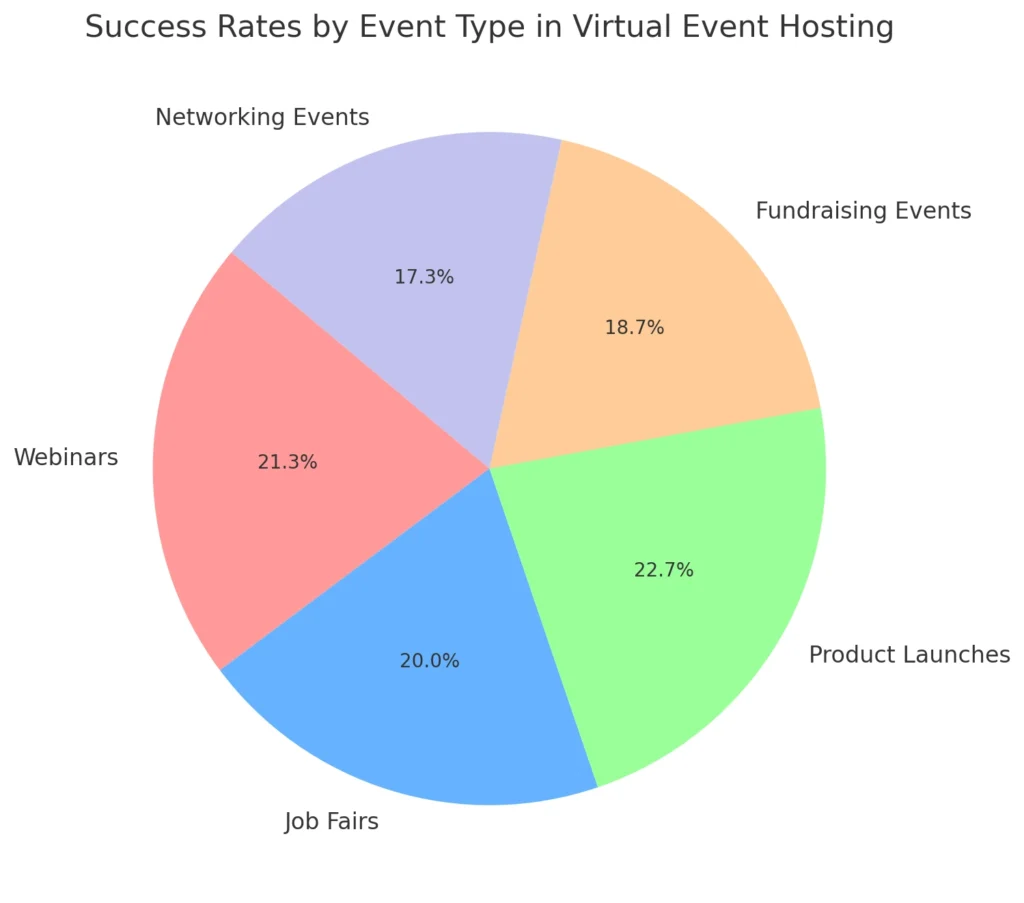In today’s digital-first world, virtual events have transformed from a temporary necessity into a thriving industry with immense growth potential. As companies and individuals realize the benefits of connecting globally without the constraints of location, virtual event hosting has emerged as one of the most promising business ventures. From hosting webinars and virtual conferences to online workshops and trade shows, the possibilities are vast. This industry’s explosive growth is fueled by advanced technology, enabling entrepreneurs to craft immersive, interactive experiences that cater to global audiences.
Starting a virtual event hosting business now offers an opportunity to not only capitalize on an ever-expanding market but also to create meaningful connections that bridge physical gaps. Whether you’re a tech-savvy entrepreneur or someone with a passion for digital engagement, there’s room to innovate, grow, and succeed. This guide explores the top 10 business ideas within the virtual event hosting sphere, each designed to help aspiring business owners seize this modern trend.
Why Choose Virtual Event Hosting?

The virtual event hosting industry has become a powerful solution for businesses and individuals aiming to connect with audiences in a flexible, cost-effective, and far-reaching way. As more organizations embrace remote collaboration, virtual events have gained popularity not just as a convenience but as a strategic approach to broaden audience engagement. Hosting events online offers businesses the chance to reach global audiences without the limitations of physical venues, lowering overhead costs while maximizing impact.
From tech companies launching products to educators conducting large-scale webinars, virtual events offer versatility across industries. For entrepreneurs, the appeal is clear: this field continues to see double-digit growth, with demand only projected to rise as technology evolves. By leveraging features like live Q&A sessions, breakout rooms, and virtual networking opportunities, virtual events can create immersive, memorable experiences for participants. This innovation allows startups to stand out, providing unique, value-added services that meet the needs of a modern, digital audience.
Also Check : Top 10 Ideas for Online Gaming and eSports Coaching Business Startups
Current Trends and Future Opportunities in Virtual Event Hosting
The virtual event industry is rapidly evolving, driven by cutting-edge technology and shifting audience preferences. As event planners and attendees become more comfortable with online formats, new trends are shaping the landscape, providing exciting opportunities for startups to stand out.
One significant trend is the rise of immersive experiences. Through advancements like augmented reality (AR) and virtual reality (VR), virtual events can now replicate real-world interactions more closely, allowing users to engage in virtual product demos or immersive networking environments. This capability appeals to tech-savvy audiences and adds a “wow factor” that sets events apart.
Personalization is another crucial trend, as hosts use data analytics to create tailored experiences for each attendee. For example, AI-powered recommendations guide users to relevant sessions or networking groups, improving satisfaction and engagement. Virtual event platforms are also integrating interactive features like live polling, Q&A sessions, and breakout rooms, making attendees feel more connected and involved.
Looking forward, sustainability is anticipated to play a vital role. Virtual events reduce the carbon footprint compared to physical events, and as companies commit to green practices, they’re likely to favor virtual formats. This shift opens doors for businesses that prioritize eco-friendly virtual hosting solutions, capturing a growing segment of environmentally conscious clients.
To learn more about how augmented reality is revolutionizing virtual events, visit.
| Technology | Impact on Engagement | Key Benefits | Adoption Rate |
|---|---|---|---|
| Augmented Reality (AR) & Virtual Reality (VR) | High – Creates immersive experiences | Enhanced interaction, realistic simulations | Moderate |
| AI-Driven Personalization | High – Tailored experiences for users | Increased attendee satisfaction, relevant content | Growing Rapidly |
| Live Polling & Q&A Features | Moderate – Encourages participation | Real-time feedback, audience involvement | High |
| Breakout Rooms | Moderate – Facilitates networking | Smaller group discussions, increased interaction | High |
| Sustainable Event Solutions | Moderate – Attracts eco-conscious clients | Reduced carbon footprint, brand alignment | Increasing |
Top 10 Ideas for Virtual Event Hosting Business Startups
Venturing into virtual event hosting offers diverse pathways, each suited to specific audiences and needs. Here are ten impactful business ideas, perfect for entrepreneurs eager to make a mark in this dynamic industry.
| Business Idea | Target Market | Estimated Startup Cost | Profit Potential |
|---|---|---|---|
| Virtual Conference Organizer | Corporates, Associations, Educators | Medium | High |
| Webinar Hosting Service | Small Businesses, Educators, Consultants | Low to Medium | Moderate |
| Virtual Trade Show Organizer | B2B, Tech, Retail | High | High |
| Online Workshop Hosting | Trainers, Skill Platforms, Artists | Medium | Moderate |
| Virtual Networking Event Host | Professionals, Freelancers, Startups | Low to Medium | Moderate |
| Virtual Job Fair Organizer | Companies, Universities, Agencies | Medium to High | High |
| Live Streamed Entertainment Events | Entertainment, Artists, Performers | High | High |
| Virtual Product Launches | Tech, Retail, Startups | Medium to High | High |
| Online Panel Discussions & Talk Shows | Media, Academics, Industry Experts | Low to Medium | Moderate |
| Virtual Fundraising Event Host | Nonprofits, NGOs, Communities | Medium | High |
1. Virtual Conference Organizer
- Why: Conferences remain a top choice for companies seeking global engagement.
- Startup Requirements: Webinar platform, content management tools, and networking features.
- Target Market: Corporates, industry associations, and educational institutions.
- Estimated Cost: Medium, due to platform subscription fees and tech support.
2. Webinar Hosting Service
- Why: Webinars are ideal for knowledge-sharing and product demos.
- Startup Requirements: Webinar software, registration system, and marketing tools.
- Target Market: Small businesses, educators, and consultants.
- Estimated Cost: Low to Medium, depending on the platform.
3. Virtual Trade Show Organizer
- Why: Trade shows help businesses showcase products to a broad audience.
- Startup Requirements: Virtual booths, live chat, and payment systems.
- Target Market: B2B and B2C sectors, especially tech and retail.
- Estimated Cost: High, as it requires an advanced platform.
4. Online Workshop Hosting
- Why: Workshops offer hands-on learning and are highly engaging.
- Startup Requirements: Interactive tools, real-time video streaming, and breakout sessions.
- Target Market: Skill development platforms, trainers, and artists.
- Estimated Cost: Medium, mainly for platform and content creation.
5. Virtual Networking Event Host
- Why: Networking events are vital for professional connections.
- Startup Requirements: Video conferencing, chat features, and matchmaking algorithms.
- Target Market: Business professionals, freelancers, and startups.
- Estimated Cost: Low to Medium.
6. Virtual Job Fair Organizer
- Why: Job fairs provide companies with a broad talent pool.
- Startup Requirements: Career portals, video interviews, and company branding.
- Target Market: Companies, universities, and recruitment agencies.
- Estimated Cost: Medium to High, due to platform and marketing.
7. Live Streamed Events for Entertainment
- Why: Concerts, shows, and festivals reach wider audiences online.
- Startup Requirements: High-quality streaming, ticketing, and security.
- Target Market: Entertainment industry, artists, and performers.
- Estimated Cost: High, as streaming quality is crucial.
8. Virtual Product Launches
- Why: Product launches generate hype and draw in audiences.
- Startup Requirements: Marketing tools, live streaming, and interactive elements.
- Target Market: Tech companies, retail brands, and startups.
- Estimated Cost: Medium to High, as production quality is essential.
9. Online Panel Discussions and Talk Shows
- Why: Panel discussions attract thought leaders and large audiences.
- Startup Requirements: Video conferencing tools, speaker management, and audience interaction.
- Target Market: Media, academics, and industry experts.
- Estimated Cost: Low to Medium.
10. Virtual Fundraising Event Host
- Why: Fundraising events connect nonprofits with donors globally.
- Startup Requirements: Donation portals, live streaming, and secure payment systems.
- Target Market: Nonprofits, NGOs, and community organizations.
- Estimated Cost: Medium, as secure payment processing is essential.
Also Read : Top 10 Ideas for Starting a Window Cleaning Business Startups
Real-World Examples
The virtual event hosting industry is rich with success stories that demonstrate the versatility and profitability of online gatherings. From multinational companies to small nonprofits, organizations across the globe have embraced virtual events to reach wider audiences, save on costs, and deliver memorable experiences.

Take, for instance, Apple’s annual product launches, which have transitioned into highly anticipated virtual showcases. Each launch event garners millions of views worldwide, allowing Apple to engage its audience directly and create buzz around new products without the logistical challenges of an in-person event. This approach not only boosts visibility but also allows real-time interaction through live chats and Q&A sessions, keeping viewers engaged and informed.
Another example is the rise of virtual job fairs organized by LinkedIn, where employers and job seekers meet on a shared platform, breaking down geographical barriers. These job fairs are efficient, allowing recruiters to assess candidates and hold preliminary interviews online, significantly speeding up the hiring process while reaching a larger pool of candidates.
Nonprofits have also found success with virtual fundraising events. The American Cancer Society, for example, held a virtual gala that raised millions of dollars in donations. By using an online platform, they engaged donors through live-streamed entertainment, real-time donation tracking, and interactive sessions with supporters, proving that virtual events can have both social and financial impact.
Read more:-Top 10 Ideas for Mobile Advertising Services Business Startups
Mistakes to Avoid When Starting a Virtual Event Hosting Business
Starting a virtual event hosting business offers numerous opportunities, but it also comes with challenges that can hinder success if not properly managed. Here are some common pitfalls to avoid to ensure a smoother path to establishing a reputable and successful business.
1. Underestimating Technical Needs
- Mistake: Many startups underestimate the importance of robust, reliable technology. Technical glitches during live events can lead to frustrated attendees and damage your reputation.
- Solution: Invest in high-quality, scalable platforms and perform thorough tests before every event. Make backup plans for any technical issues that may arise.
2. Neglecting Audience Engagement
- Mistake: Some hosts treat virtual events as one-sided presentations, failing to engage the audience actively.
- Solution: Incorporate interactive elements like live Q&A sessions, polls, breakout rooms, and chat features to keep attendees involved and engaged throughout the event.
3. Ignoring Data Security
- Mistake: With the increase in virtual attendance, securing attendee data is essential. Failing to implement secure systems can lead to data breaches and loss of trust.
- Solution: Choose platforms that prioritize data security, employ secure payment gateways, and follow data protection best practices.
4. Overlooking Branding and Marketing
- Mistake: Successful virtual events rely on a strong brand presence and effective marketing. Many new businesses overlook this and fail to attract their target audience.
- Solution: Develop a solid marketing strategy that includes social media, email campaigns, and partnerships with influencers or other brands to expand your reach.
5. Skipping Post-Event Analysis
- Mistake: Some startups fail to analyze event performance, missing valuable insights that could improve future events.
- Solution: Conduct post-event surveys and review metrics like attendance, engagement, and feedback. This analysis can provide critical information for refining and enhancing future events.
For a comprehensive guide on data security best practices, explore.
| Mistake | Impact | Preventive Measure |
|---|---|---|
| Underestimating Technical Needs | Frustrated attendees, reputation loss | Invest in quality tech and have backup plans |
| Neglecting Audience Engagement | Low engagement, poor attendee experience | Use interactive features like Q&A and polls |
| Ignoring Data Security | Data breaches, loss of trust | Use secure platforms and follow data protection practices |
| Overlooking Branding and Marketing | Low attendance, limited reach | Develop a strong marketing strategy |
| Skipping Post-Event Analysis | Missed improvement opportunities | Conduct surveys and analyze performance metrics |
Why Trust Miracuves Solutions for Your Next Project?
Choosing the right partner for your virtual event hosting needs is crucial, and Miracuves Solutions stands out as a trusted choice. With extensive experience in app and platform development, Miracuves Solutions brings a deep understanding of the technical and strategic aspects required to create seamless, engaging virtual events. From customized interfaces to advanced interactive features, they offer solutions tailored to your unique business needs.
Miracuves Solutions has a strong track record of helping clients succeed in the digital event space, combining innovation with reliability. Their focus on security, scalability, and user-friendly experiences ensures that your attendees will have a memorable, trouble-free event. Additionally, the team stays ahead of industry trends, continually integrating new technologies like AI and VR, allowing your business to remain competitive and innovative in an evolving marketplace.
By trusting Miracuves Solutions, you’re partnering with experts who prioritize your success. Their commitment to quality, combined with cost-effective solutions, makes them the ideal choice for startups looking to establish a strong presence in virtual event hosting.
Conclusion
Starting a virtual event hosting business opens a world of possibilities in today’s digital landscape, offering solutions that are both profitable and impactful. As businesses and individuals increasingly turn to online formats for everything from conferences to fundraisers, the demand for innovative and engaging virtual events continues to grow. By focusing on the latest trends, understanding potential challenges, and choosing the right tools and partners, aspiring entrepreneurs can carve out a successful space in this thriving industry.
Whether you’re planning to launch a virtual networking service, organize online workshops, or host large-scale virtual product launches, this guide provides the foundational insights needed to take action. By prioritizing audience engagement, ensuring a seamless user experience, and staying attuned to market demands, you can create events that not only capture attention but also leave a lasting impression. With the right approach, your virtual event hosting business is poised for success.
FAQs
What are the main benefits of starting a virtual event hosting business?
Virtual event hosting offers flexibility, global reach, and lower costs compared to traditional events. It also allows businesses to engage with audiences worldwide without logistical limitations.
What is the minimum investment required to start a virtual event-hosting business?
Costs vary depending on the scale and technology used, but a basic setup can start at a few hundred dollars for essential tools and platforms. Larger-scale events may require additional investments in tech and marketing.
How can I make my virtual events more engaging for participants?
Use interactive features like live Q&As, breakout rooms, polls, and networking lounges to keep attendees actively engaged. Personalization and audience-focused content also enhance engagement.
What are some common challenges in virtual event hosting?
Common challenges include technical issues, audience engagement, and ensuring data security. Proper planning, reliable platforms, and backup plans can help overcome these obstacles.
Is a virtual event hosting business profitable in the long run?
Yes, the virtual event industry continues to grow as more companies embrace online engagement. With the right strategies, virtual event hosting can be a profitable and scalable business venture.
Related Articles:








